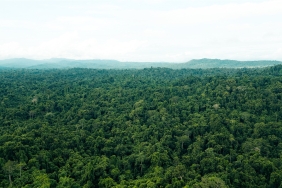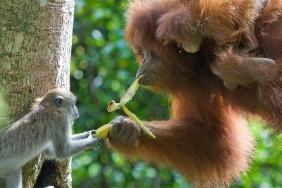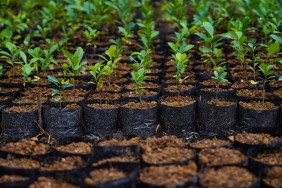STOP PROTECTED WILDLIFE TRADE! SECURE FOOD SUSTAINABILITY
Jakarta, November 5, 2018. Taking the moment of the National Wildlife Day (HCPSN), stakeholders of biodiversity conservation in Indonesia; the Ministry of Marine Affairs and Fisheries (KKP), the Indonesian National Police (Polri), the Attorney General's Office (AGO), the Corruption Eradication Commission (KPK), the Financial Transaction Reports and Analysis Center (PPATK), the House of Representatives (DPR), the Indonesian National Army (TNI), non-governmental organizations, religious leaders, art workers, and athletes of the 2018 Asian Para Games launched the "Stop Illegal Trade in Protected Wildlife" campaign in Jakarta.
The campaign has the ultimate goal of reducing the level of protected wildlife trade by increasing public participation in reporting suspected protected wildlife trade offenses to the Indonesian Police Criminal Investigation Agency (BARESKRIM POLRI) online through the Protected Wildlife E-Reporting application on mobile phones or tablet computers.
"I urge the public to help report through the Protected Animal E-Reporting application if they are aware of any wildlife trade that occurs both online and offline," said General Tito Karnavian, Chief of the Indonesian Police in his statement of support for this campaign. "I order all ranks of the Indonesian National Police to prevent and strictly enforce the law against anyone who commits crimes and trade in protected wildlife," said Tito again.
Asia is at the center of the global protected wildlife trade as a source, transit route, and sales market for endangered and high-priced wildlife. This multi-million dollar business threatens the survival of key animals such as tigers, elephants, rhinos, orangutans, sharks, rays, turtles and other animals that have important functions for the balance of the ecosystem.
Indonesia, as one of the countries in Asia with the richest natural resources and highest biodiversity of endemic animals in the world, has become the source and destination of wildlife trade. Based on WWF-Indonesia data, it is found that 85% of wildlife traded comes from the wild and poached.
According to the International Enforcement Agency (IEA), the value of the global wildlife trade is equivalent to that of human trafficking, narcotics, and illicit weapons. The trade in protected wildlife has complex or covert transaction channels and is more openly conducted through e-commerce, marketplaces and social media.
The WWF Living Planet Report 2018, launched on October 30, revealed that at least 60 percent of vertebrate animals were lost in less than 50 years. The main threats to the species identified in the report are directly linked to human activities, one of which is wildlife trafficking due to the high market demand for some species.
The loss of key animals disrupts the balance of ecosystems which in turn disrupts the food chain in nature. For example, the decline of tiger populations has led to an increase in wild boar populations, which then become pests for farmers around the forest. This also happens in the sea, where the decline in shark populations has increased the population of carnivorous fish underneath, which has resulted in the depletion of algae-eating herbivorous fish, turning the sea into a dead zone due to the explosion of algae populations. This condition will harm the fisheries sector because there are no fish that can live and breed due to low oxygen levels. The link is clear between the loss of key animal populations and the threat to our food sustainability.
"Indonesia is blessed with a wealth of natural resources and biodiversity including the highest number of endemic animals in the world. But poaching and the wildlife trade are making our forests increasingly desolate. Unfortunately, Indonesia is both a source and a market in Asia's illegal wildlife trade chain. This poaching and illegal trade impacts the survival of key species in the wild and the balance of the ecosystem. The unbalanced food chain then results in the decline of people's welfare," said Rizal Malik, CEO of WWF-Indonesia.
It takes the cooperation of various parties to commit to taking firm steps to stop the trade in protected wildlife. The public is expected to actively report wildlife crime and trade to the authorities directly or through the Protected Animal E-Reporting application managed by BARESKRIM POLRI. In addition, to ensure that law enforcement can provide a deterrent effect for violators of protected wildlife crimes, public support can also be conveyed through a petition to revise Law Number 5 of 1990 concerning the Conservation of Living Natural Resources and Ecosystems at change.org/revisiuukonservasi.





